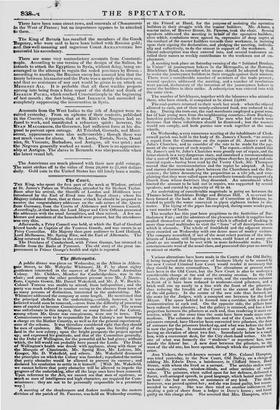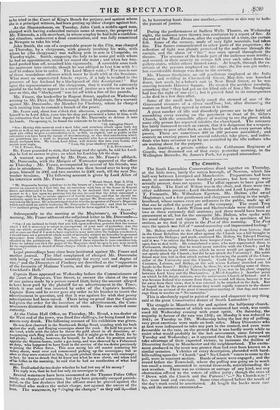Various alterations have been made in the Courts of the
Old Bailey, it being imagined that the increase of business likely to he caused by the new Central Criminal Law Court would render it necessary that they should be more commodious. The alterations at present made have been in the Old Court, but the New Court is also to undergo a considerable change at the end of the ensuing session. In the Old Court, the gallery side is done away with, and the cumbrous columns in front of it have been reduced to moderate-sized pilasters, and a brick wall run up nearly in a line with the front of the pilasters; thus reducing the breadth of the Court to the extent of the depth of the old gallery. In the centre of the new side thus formed, are the seats for the Judges, with a canopied one between for the Lord Mayor. The space behind is formed into a corridor, with a door of communication at each end. On the opposite side, the pillars have been reduced into pilasters ; but the gallery is retained, and has a bow projection between the pilasters at each end, thus rendering it more ex- tensive, while at the same time the seats have been made more com- modious. The columns at the northern end of the Court, where the prisoners entered, have likewise been converted into pilasters, the door of entrance for the prisoners blocked up, and what was before the dock is now the jury-box. It consists of two rows of seats, the back one having an elevation of about two feet. Immediately below is a small box, with a convenient desk, for the City short-hand writer. On the site of what was formerly the " students"' or reporters' box, now stands the felons' bar. A new door between the pilasters, to the west of the old one, has been opened, through which the prisoners will enter.
Ann Vickers, the well-known servant of Mrs. Colonel Hampton, was tried yesterday, in the New Court, Old Bailey, on a charge of robbing Mr. Edwin Dove, a hairdresser, in Clifford Street, Bond Street, with whom she lived as a servant. The articles stolen were wax-candles, curtains, window-blinds, and other articles of small value. The prisoner, when called upon for her defence, delivered a fluent, well-arranged speech, in good language, which lasted more than an hour : she had no notes, or assistance of any kind. The theft, however, was proved against her; and she was found guilty, but recom- mended to mercy. She was then tried on another indictment, for stealing a pair of shoes from a lodger in Dove's house ; and found guilty on this charge also. She asserted that Mrs. Hampton, who is
tobe tried in the Court of King's Bench for perjury, and against whom she is a principal witness, had been getting up these charges against her.
At the Mansionhouse, on Tuesday, John Card, a middle-aged man, charged with having embezzled various sums of money, the property of Mr. Edmonds, a silk-merchant, in whose employ he had held a confiden- tial situation, underwent a final examination, and was fully committed to Newgate to take his trial,
John Smith, the son of a respectable grocer in the City, was charged on Thursday, by a clergyman, with grossly insulting his wife, with whom he (the clergyman) was walking arm in arm in Cheapside, on Tuesday night. Smith, supposing the lady to be some girl with whom be had an appointment, seized her round the waist ; and when her hus- band pushed him off, assaulted him vigorously. A constable soon took the aggressor into custody, though he was obliged to beat him with his staff to reduce him to order. The Lord Mayor said—" The case is one of those scandalous offences which must be dealt with at the Sessions. What must an unprotected female expect, if a lady is insulted in the presence of her husband by a blackguard of this description ?" But upon the representation of the clergyman, that it would he extremely painful to the lady to appear in a court of justice as a witness in such a case as this, the " blackguard " was let off with a fine of live pounds.
Mr. Fraser, the bookseller in Regent Street, applied on Wednesday evening to Mr. Dyer, the Marlborough Street Magistrate, for a warrant against Mr. Duncombe, the Member for Finsbury, whom he charged with inciting him to commit a breach of the peace.
Mr. Fraser said, about four o'clock that afternoon, a gentleman, who stated himself to be Lord Allen, came into his shop and presented a letter to him, with the intimation that he had been deputed by Mr. Duncombe to deliver it iuto his hands. On opening it, he found the contents to be as follows.
"13, Arlington Street. "SIR—Having this moment read a most false and atrocious attack upon both my
public as well as my private character, iu your Magazine for the present month, I call upon you either to give a contradiction to it, as full, as explicit, and as public as the calumnies you have been the means of disseminating, or else that satisfaction which one gentleman has a right to demand from another who has so unwarrantably and falsely maligned him. 111y friend, Lord Allen, will deliver this into your hands, and receive your reply. " I am, Sir, your obedient servant, " To J. Fraser, Esq. " T. S. DuNcostnz."
Mr. Fraser proceeded to state, that having read the epistle, he told his Lord- ship he had no answer to give ; on which his Lordship left the shop.
A warrant was granted by Mr. Dyer, on Mr. Fraser's affidavit. Mr. Duncombe, with the Marquis of Worcester appeared at the office on Thursday : Mr. Fraser, accompanied by several of his friends, was also in attendance. Mr. Duncombe was then bound over to keep the peace, himself in 5001. and two sureties in 2501. each, till the next No- vember Sessions. The following account is given by Lord Allen of his interview with Mr. Fraser.
" Mount Street, Sept. 3, 1834. " Mr. Duncombe having asked me to be the bearer of a letter to Mr. Fraser, and to receive an answer to it, I had this day an interview with him at his h;mse in Regent Street, and delivered it to him, Raying read it, he declared that he could give no answer to it ; but upon my pressing him for one, he said that the letter contained a challenge—that Ile by no means approved of hostile meetings, and that he should im- mediately apply to a Magistrate for a warrant against Mr. Duncombe, and bind him over tokeep the peace. Ile acknowledged that he was the proprietor of Fraser's Magazine which contained an article traducing Mr. Duncombe's character ; and that he would :::■ve declined giving the name of the author had he been applied to for it. " ALLEN."
Subsequently to the meeting at the Magistrate's, on Thursday morning, Mr. Fraser addressed the subjoined letter to Mr. Duncombe-
" 215, Regent Street, Thursday, 2 o'clock, P. U. " Ste—I am inclined to think that you will, upon reflection, perceive that the course which I felt it necessary to adopt in consequence of your note of yesterday, was the only one which, as publisher of the Magazine, I could have possibly pursued. You will at once see that if I were to have replied to your note after the fashion you desired, I should have set a precedent which would of necessity subject me hereafter to personal annoyance from everybody. high and low, who might fancy himself injured or offended in the publication. Having submitted these remarks to your consideration, I have to inform you that the pages of the Magazine shall be open to you next month fur the explanation or denial of those charges which you have stated to be • false and atrocious.' "
Legal proceedings have since been instituted against Mr. Fraser and another journal. The libel complained of charged Mr. Duncombe with being " one of infamous notoriety for every sort and degree of vice;" and the Dissenters of Finsbury are described as the "supporters of the favourite of Madame Vestris, and the patron of and partner in Crockford's Hell."
Captain Ross appeared on Wednesday before the Commissioners of the Court of Requests, Vine Street, to answer the claim of the sum of one guinea made by a person named Hatt, being the amount alleged to have been paid by the plaintiff for an advertisement in the Times, which it was said was inserted by order of the Captain's brother. Captain Ross said he never gave any order to his brother to insert the advertisement in question, and that it was against his wish that penny subscriptions had been raised. There being no proof that the Captain had given the-order for the insertion of the advertisement, the Com- missioners dismissed the demand with costs. The case excited some- Curiosity.
At the Union Hall Office, on Thursday, Mr. Broad, a tea-dealer at the West end of the town, was fined five shillings, for being found in the Streets very drunk. The following account of his exhibition was given. He was first observed in the Southwark Bridge Road, standing with his back against the wall, and flinging sovereigns about the road. He held his purse in one hand, while with the other he threw the gold about in all directions, ac- coeipanying each fling with an expression that it might go to the Devil, for he had plenty. Luckily, however, for himself, he had taken his position nearly opposite the Station-house, under a gas lamp, and was observed by a Policeman on duty, who happened to have lived in the service of the tea-dealer previously to Joining the Police force. This man seeing his old master scattering his money about, went over and commenced picking up the sovereigns; but as often as they were restored to him, he again] pitched them away with contempt ; in fact, he was so drunk that he knew not what he was about, and when told of his follies in the morning, he said that he had no recollection of what had occurred.
Mr. Traill asked the tea-dealer whether he bad lost any of his money ?
The reply was, that he hail lost only six sovereigns in all.
Several watermen have been summoned at the Thames Police Office lately, on charges of extortion; but they have generally escaped punish- ment, as the law declares that the offence must be proved against the individual who makes the unfair charge, not against the owner of the boat. The waterraim, by "ringing the changes" as they call it,—that
is, by borrowing boats from one another,—contrive in this way to battle the pursuit of justice.

















 Previous page
Previous page